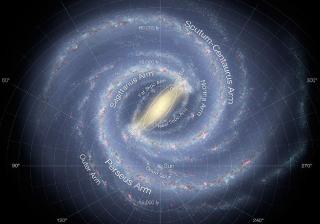Gutiérrez, C. M.; López-Corredoira, M.
Bibliographical reference
The Astrophysical Journal, Volume 713, Issue 1, pp. 46-51 (2010).
Advertised on:
4
2010
Journal
Citations
10
Refereed citations
9
Description
The optical spectra of objects classified as QSOs in the Sloan Digital
Sky Survey Data Release 6 are analyzed with the aim of determining the
value of the fine structure constant in the past and then checked for
possible changes in the constant over cosmological timescales. The
analysis is done by measuring the position of the fine structure lines
of the [O III] doublet (λλ4959 and λλ5008)
in QSO nebular emission. From the sample of QSOs at redshifts z <
0.8, a sub sample was selected on the basis of the amplitude and width
of the [O III] lines. Two different methods were used to determine the
position of the lines of the [O III] doublet, both giving similar
results. Using a clean sample containing 1568 of such spectra, a value
of Δα/α = (+2.4 ± 2.5) × 10-5
(in the range of redshifts z ~ 0-0.8) was determined. The use of a
larger number of spectra allows a factor ~5 improvement on previous
constraints based on the same method. On the whole, we find no evidence
of changes in α on such cosmological timescales. The mean
variation compatible with our results is
1/langtrangΔα/α = (+0.7 ± 0.7) ×
10-14 yr-1. The analysis was extended to the [Ne
III] and [S II] doublets, although their usefulness is limited due to
the fact that all these doublets in QSOs tend to be fainter than [O
III], and that some of them are affected by systematics.
Related projects

Morphology and dynamics of the Milky Way
This project consists of two parts, each differentiated but both complementary: morphology and dynamics. Detailed study of the morphology of the Milky Way pretends to provide a data base for the stellar distribution in the most remote and heavily obscured regions of our Galaxy, through the development of semiempirical models based on the
Martín
López Corredoira